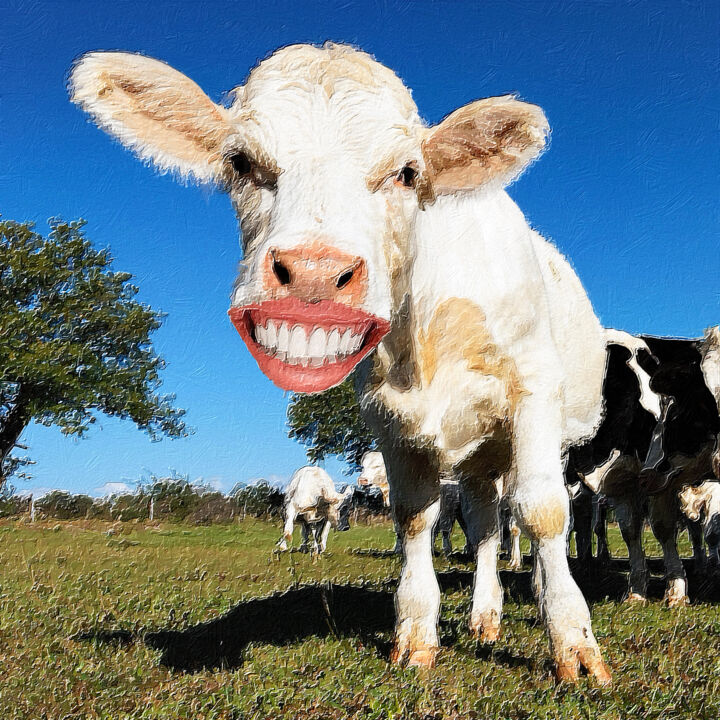
The concept of a "happy cow" transcends mere imagery; it embodies a philosophy of animal welfare and sustainable farming practices. These bovine creatures, often seen grazing peacefully in lush green pastures, symbolize a life free from stress and discomfort. The idea of a happy cow has gained traction in recent years, aligning with consumer preferences for ethically sourced dairy products and meat. By prioritizing the well-being of cows, farmers are not only improving the quality of life for these animals but also enhancing the quality of the products they produce.
As society becomes more conscious of animal rights and the environmental impact of farming, the happy cow movement highlights the importance of humane treatment in agriculture. From the grassy fields to the dairy barn, the journey of a happy cow is a testament to the benefits of compassionate farming practices. This article delves into what defines a happy cow and explores the broader implications for farming, consumer choices, and the environment.
In this exploration, we will address common questions surrounding the concept of a happy cow, including how they are raised, the benefits of happy cows for consumers, and the impact on local ecosystems. By understanding these aspects, we can appreciate the significant role that happy cows play not just in our diets but in the farming landscape as a whole.
What Makes a Cow Happy?
To understand the essence of a happy cow, we must first examine the factors that contribute to their happiness. Key elements include:
- Access to Pasture: Happy cows graze on lush grass, which is essential for their physical health and well-being.
- Social Interaction: Cows are social animals and thrive in herds, where they can interact and bond with one another.
- Comfortable Living Conditions: Adequate shelter, clean bedding, and plenty of space are crucial in keeping cows happy.
- Nutritional Diet: A balanced diet rich in essential nutrients contributes to the overall health of the cow.
How Do Happy Cows Impact Dairy Production?
Farmers who prioritize the well-being of their cows often see a direct correlation with productivity. Happy cows tend to produce higher quality milk, which is crucial for both dairy producers and consumers. The reasons behind this include:
- Reduced stress levels lead to better milk yield.
- Healthier cows have fewer medical issues, resulting in lower veterinary costs and less downtime.
- Higher quality milk often translates to better prices for farmers.
Why Should Consumers Care About Happy Cows?
In an era where ethical consumerism is on the rise, understanding the importance of happy cows can significantly influence purchasing decisions. Consumers should care about happy cows for several reasons:
- Healthier Products: Milk and meat from happy cows are often free from harmful additives and antibiotics.
- Supporting Ethical Farming: Purchasing products from farms that prioritize animal welfare promotes sustainable farming practices.
- Environmental Benefits: Happy cows contribute to healthier ecosystems through responsible grazing practices.
What Are the Signs of a Happy Cow?
Identifying a happy cow involves observing several behavioral and physical traits. Signs of a happy cow include:
- Relaxed body language and posture.
- Grazing and ruminating regularly.
- Curiosity and engagement with their environment.
- Maintaining a healthy weight and coat condition.
How Can We Foster Happiness in Cows?
Farmers and consumers alike can play a role in fostering happiness in cows. Here are some strategies:
- Promote Pasture-Based Farming: Encourage farms that allow cows to graze freely in pastures.
- Support Local Farmers: Buy dairy and meat products from local farms with humane practices.
- Advocate for Animal Welfare: Support legislation and initiatives that protect animal rights.
What Role Does Technology Play in Ensuring Cow Happiness?
Modern technology has the potential to revolutionize the way we care for cows. Innovations such as:
- Wearable health monitors that track the well-being of cows.
- Automated feeding systems that ensure cows receive a balanced diet.
- Sensors that monitor environmental conditions and ensure optimal living spaces.
Are Happy Cows Better for the Environment?
Yes, happy cows contribute positively to the environment. Sustainable farming practices that prioritize the well-being of cows often lead to:
- Reduced greenhouse gas emissions through responsible grazing.
- Improved soil health and biodiversity.
- Conservation of water resources through efficient management.
Conclusion: The Future of Happy Cows in Agriculture
As we move forward into a future that values ethical treatment of animals, the concept of the happy cow will continue to gain importance. By understanding the benefits of happy cows, consumers can make informed choices that promote animal welfare and sustainability. From better health outcomes to enhanced product quality, the journey of a happy cow is essential not only for the cows themselves but for the entire agricultural ecosystem.
ncG1vNJzZmirn521b6%2FOpmasp5idu6bD0qCcq7FnZLWivM%2ByZJynp2O1tbnL